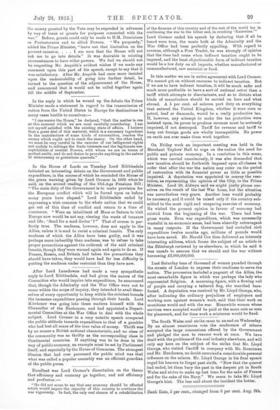On Friday week an important meeting was held in the
Merchant Taylors' Hall to urge on the nation the need for public and private economy. In a resolution in this sense, which was carried unanimously, it was also demanded that new taxation should be forthwith imposed upon all classes in order that after the war the nation may enter on the period of restoration with its financial power as little as possible impaired. A deputation was appointed to convey the reso- lution, as representing the opinion of the City, to the Prima Minister. Lord St. Aldwyn said we might justly plume our- selves on the result of the last War Loan, but the situation was nevertheless very grave. Another loan would probably be necessary, and it could be raised only if the country sub- mitted to the most rigid and unsparing exercise of economy. He wished the present opinion in favour of economy had existed from the beginning of the war. There had been gross waste. Even war expenditure, which was necessarily wasteful in an economic sense, bad been absurdly extravagant in many respects. If the Government had curtailed civil expenditure twelve months ago, millions of pounds would have been saved. Mr. Harold Cox then delivered an intensely interesting address, which forms the subject of an article in the Edinburgh reviewed by us elsewhere, in which he said it was unsafe to assume that we should end the war without borrowing £2,000,000,000.


































 Previous page
Previous page